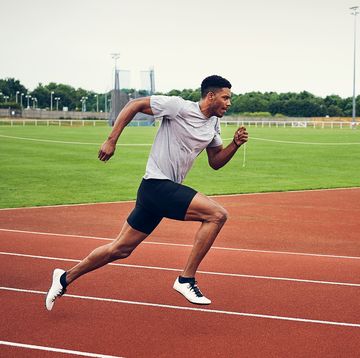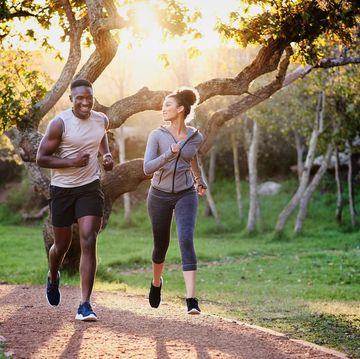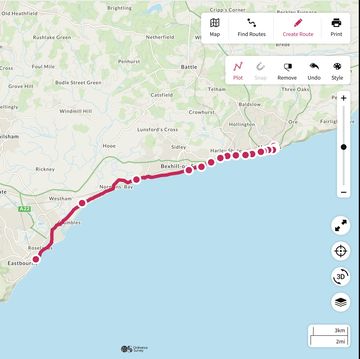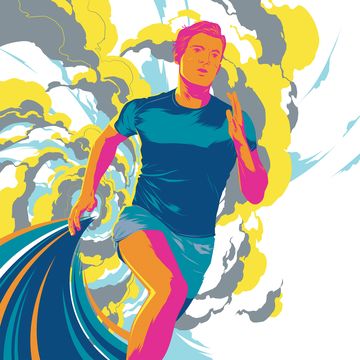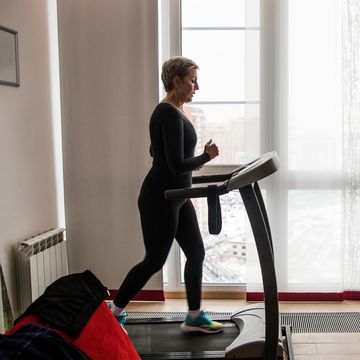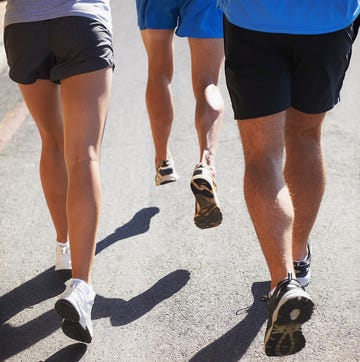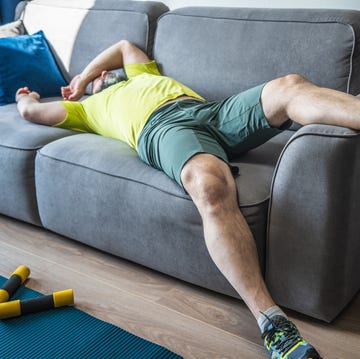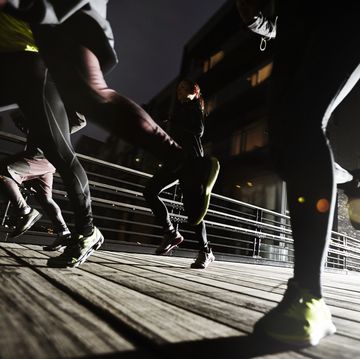Part of the fun of summer running is complaining about the heat. Oh, you ran a 10-miler in yesterday’s 30-degree temps? I’ll one-up you with my half marathon in 85 percent humidity.
As all runners know, sweat is an unavoidable part of our sport—chances are, you’ll break a sweat even when running on the coldest days of the year. It’s also a super important bodily function! Your ability to sweat is what keeps you from overheating, so you can actually finish those running workouts without keeling over. That’s why you can outlast your energetic pup while running far on a hot day—you can regulate your body temperature with sweat on-the go, while dogs must stop and pant in order to cool off.
That said, sometimes our sweat glands work on overdrive, which can be irritating and embarrassing. If you’re concerned about the fact that you feel like you’ve got swamp ass while the person jogging next to you doesn’t even look dewy, here’s what the experts have to say about how much you’re supposed to sweat during a workout.
What’s the point of sweating, anyway?
Sweating is the body’s way of naturally cooling itself down. 'Think of sweating as your body’s ventilation system,' explains Peter Bidey, Active vs. passive recovery: Which rest is best.
When your body starts to heat up—whether due to a change in your own body temperature, a change in the temperature outside, or in response to stress, foods, medications, or illnesses—your central nervous system sends signals to the sweat glands located throughout your body to cool you down. The cooling happens when 'the heat from the skin surfaces dissipates as your sweat evaporates,' says David Lortscher, M.D., a dermatologist and the CEO of Curology.
FYI: There are two types of sweating: thermoregulatory (when your body sweats to cool off) and emotional sweating. Emotional sweating is a bodily response to stress and other emotional stimuli. That’s because stress activates the hypothalamus, which serves as a thermal regulatory centre for the body, explains Osita Onugha, M.D., a thoracic surgeon at Providence Saint John’s Health Centre’s Hyperhidrosis Program in Santa Monica, California.
'During stress, the hypothalamus sends neurotransmitter signals to the apocrine sweat glands, which stimulates sweat production,' Onugha says. That would explain why runners break out in a sweat before a big race—your body isn’t overheating, it’s just nervous.
Why do some people sweat more than others?
The average person sweats between 0.8 litres (27 ounces) and 1.4 litres (47 ounces) during an hour-long workout. But just like some people can run faster than others, some people sweat more than others.
'Your body is actually continually sweating throughout the day,' explains Bidey. 'You just don’t notice the beads of sweat and their accumulation on your clothes until the rate of evaporation is exceeded by your rate of perspiration, or sweat production.'
Your rate of perspiration is going to be affected by your weight, age, gender, and stress levels, which is why you might feel like a soggy mess compared to the person running on the treadmill next to you. The heavier you are, the older you are, and the more stressed you are, the more sweat you’re likely to produce. (Also, you don’t need an expert to tell you this, but men tend to sweat more than women. 'Men are larger, so their sweat glands must work harder to cool down more skin surface area,' says Lortscher.)
If you’re especially sweaty in specific areas—let’s say your hair is guaranteed to be soaked even during an easy run, or you always have a sweat spot on your stomach—it’s probably due to overactive clusters of certain sweat glands.
'Some people unfortunately have a higher number of hyperactive sweat glands, and as a result excessively sweat more than others,' says Bidey.
There is no objective way to tell if you are an excessive sweater, says Onugha. But if sweating affects your ability to perform daily activities (such as holding a pen or wearing flip flops), you could be part of the one percent of the population with hyperhidrosis, which is a condition with excessive sweating of the hands, armpits, and feet that starts as soon as you wake up and stops while you sleep, says Onugha.
'It’s not clear what causes people to sweat abnormally like this, although a certain percentage of people who have hyperhidrosis also have abnormal nerve connections,' he adds.
What are the downsides of sweat?
Well, there’s the obvious: the smell. You have two types of sweat glands: eccrine and apocrine. While sweat from your eccrine glands is odourless, it’s the apocrine sweat that you should worry about. 'Sweat from your apocrine glands is usually a little thicker and, as it breaks down and mixes with bacteria found on your body, it can produce a body odour,' Bidey says.
When your sweat breaks down and mixes with bacteria, it can also cause gross discolourations or yellowing of your clothing materials, which is why you might want to steer clear of light-coloured workout wear.
And then, of course, there’s acne. But before you jump to the conclusion that sweating more will enrage your pores, listen up.
'Exercise and sweat don’t cause acne,' explains Lortscher. 'The eccrine glands produce sweat, and the sebaceous glands produce sebum, or oil—so revving up the sweat glands doesn’t actually activate the oil glands involved in acne breakouts. However, the moisture produced may encourage acne-causing bacteria to proliferate.' A breakout is even more likely if friction is involved, he says—like when a sports bra rubs on the back or shoulders.
What can you do about it?
Sweating is necessary to keep you from overheating, but if you feel like you’re overly sweaty, there are some things you can do to dry out.
First, while hyperhidrosis is rare, genetic issues, some medications (like antidepressants, some migraine meds, and opioid painkillers), and underlying conditions (including diabetes, thyroid gland diseases, and pregnancy) could lead to abnormal sweating, too. Spicy foods and caffeinated beverages, such as Buffalo chicken wings and coffee, can also make you sweat more than usual. If your amount of perspiration is affecting your quality of life, you should definitely head to your doc to see if they can get to the bottom of things.
A deodorant or antiperspirant can reduce the odour or visibility of sweat. 'The goal of deodorant is to mask the "odour" with a fragrance; the goal of an antiperspirant is to stop sweating,' says Onugha. 'When you look closely at the ingredients, antiperspirants usually have a metal like aluminium or zinc that blocks the pores from releasing sweat.'
There are also prescription antiperspirants like Drysol, that can be used to decrease excess sweat production, and Botox injections are also used in high sweat production locations on your body (such as the armpits or scalp) to decrease excessive sweating, says Bidey.
Otherwise, there are some easy practical changes you can make to prevent B.O. and pit stains. Here are a few ways to minimise the icky effects of sweat, according to Lortscher:
- hydration myths that could hurt your health
- Opt for light, breathable fabrics, such as cotton or bamboo, which tend to get less stinky than synthetic materials
- How to treat tight calves for better running
- If you’re exercising outside, go for light-coloured clothing since darker colours absorb more of the sun’s rays and heat your skin more
The good news is, the more you run, the more efficient your body becomes—meaning, the less overheated you’ll be and the less sweat you’ll produce. So don’t use the temp as a reason to flake on your workout!


